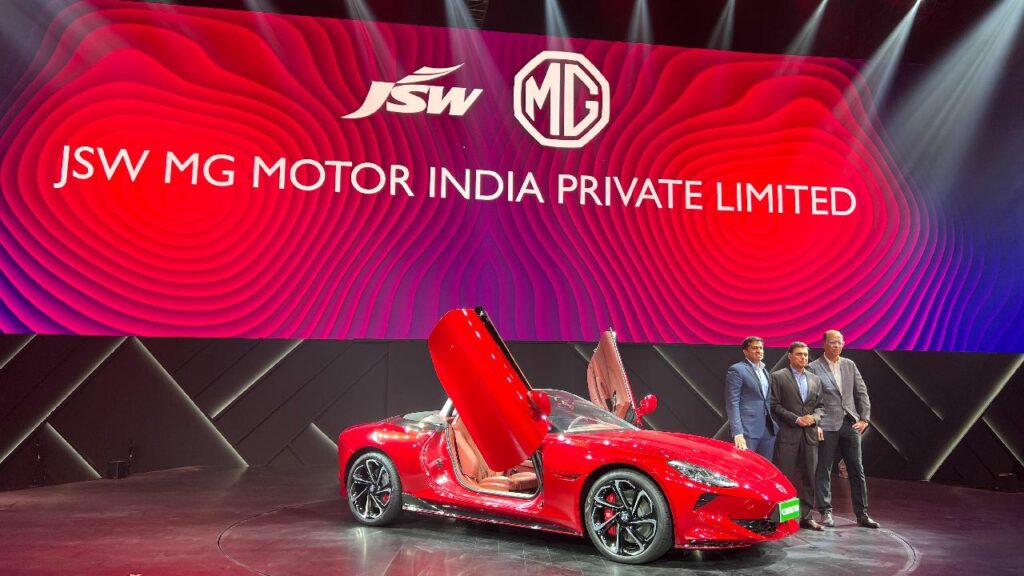Published
4 months agoon

In a move that aims to shake up the Indian automotive industry, JSW Group and SAIC Motor-owned MG Motor India have joined forces to produce electric and internal combustion engine cars.
With JSW’s recent acquisition of a 35% stake in MG Motor India, the partnership is poised to challenge the dominance of established players like Maruti and Tata Motors. This collaboration marks an exciting new chapter in India’s automotive landscape, with a strong focus on electric vehicles (EVs) and a vision to capture a significant share of the New Energy vehicle market by 2030.
The Birth of a Partnership
The seeds of this groundbreaking partnership were sown when JSW Group, led by Chairman Sajjan Jindal, acquired a 35% stake in MG Motor India from SAIC Motor. The move signaled JSW’s commitment to entering the automotive sector and competing with industry giants like Maruti and Tata Motors. With a clear objective in mind, JSW aims to create a “Maruti moment” by launching one electric vehicle every 3-4 months, emulating the success of Maruti’s market dominance in the 90s.
A Focus on New Energy Vehicles
Recognizing the importance of reducing India’s dependency on oil imports, JSW Group is placing a strong emphasis on new energy vehicles. By leveraging the technology and expertise of MG Motor, the joint venture aims to produce the most advanced modern EVs in India. This strategic move aligns with India’s vision to achieve global parity in the EV segment and positions JSW MG Motor India as a key player in driving the adoption of electric mobility.
“With the technology from MG and the group’s strength, we are also building a charging system. Our focus is not only on manufacturing EVs but also on creating a comprehensive ecosystem to support their widespread adoption,” said Sajjan Jindal, Chairman of JSW Group.
A Vision for the Future
With its sights set on the future, JSW MG Motor India plans to foray into the premium passenger vehicle segment. By 2030, the company aims to establish a leadership position in the New Energy vehicle category, boasting an extensive product portfolio. As a testament to this vision, MG recently unveiled its premium offering, the MG Cyberster. This sleek and futuristic electric vehicle is set to captivate the market and contribute to MG’s goal of capturing 33% of the New Energy vehicle segment by 2030.
“MG India 1.0 has had a very good 5 years, and it is now up to the joint venture to make MG 2.0 even more impactful and successful,” says Parth Jindal, Managing Director of JSW Cement.
Expanding Production Capacity
To meet the growing demand for their innovative vehicles, JSW MG Motor India plans to increase its production capacity. The company’s manufacturing facility in Halol, Gujarat, will play a pivotal role in scaling up production. Currently producing over 100,000 cars annually, the facility is expected to ramp up its output to as many as 300,000 cars per year. This expansion will not only boost the company’s manufacturing capabilities but also contribute significantly to India’s automotive industry, which is projected to increase from selling four million cars to 10 million cars over the next decade.
The Road to Electrification
Electric vehicles form a significant part of MG Motor India’s sales, accounting for approximately 33% of total sales as of February 2024. The company is committed to further expanding its operations in the EV segment, with plans to introduce 4-5 new vehicle models, primarily focusing on electric variants. By 2028, MG Motor India aims to derive 65-75% of its sales from EVs, solidifying its position as a frontrunner in the electric mobility space.
The Battle for Market Share
Tata Motors currently holds the top position in India’s passenger EV sales, while MG Motor India’s overall market share in the EV segment stands at around 2%. However, with the backing of JSW Group and SAIC Motor, MG is poised to challenge Tata Motors’ dominance and carve out a larger share of the market. The growing demand for EVs in India, coupled with government initiatives and subsidies, sets the stage for MG’s ambitious growth plans.
“We want to pursue the development of the EV ecosystem in India and eventually take a leadership position in the space,” emphasised Sajjan Jindal.
A Promising Future for Electric Mobility
The Indian government’s ambitious target of achieving 30% EV sales by 2030 is driving the rapid growth of the electric mobility sector. As per the Economic Survey 2022-23, India’s EV market is projected to reach one crore units in annual sales by 2030. This surge in demand presents a significant opportunity for companies like MG and JSW to capitalize on the evolving landscape and shape the future of mobility in India.
The Road Ahead
The partnership between JSW Group and MG Motor India marks a pivotal moment in India’s automotive industry. With a focus on electric vehicles and a commitment to reducing India’s reliance on oil imports, JSW MG Motor India is poised to disrupt the market and challenge established players.
By leveraging the technological prowess of MG Motor and the manufacturing strength of JSW Group, the joint venture aims to drive the adoption of electric mobility and establish itself as a leader in the New Energy vehicle segment. As India accelerates towards an electric future, the collaboration between MG and JSW is set to play a crucial role in shaping the country’s automotive landscape for years to come.


Rs 10.7 Lakh Crore Lost in a Day: Will You Still Buy Gold After Nirmala Sitharaman’s Duty Cut?


Here’s why Elon Musk might need India more than he cares to admit


Why is Trump dodging a face-off with VP Kamala Harris?


CXO Chatter, with Kavita Singh, CHRO of Runaya


On’s LightSpray tech can make spray-on sneakers in just 5 minutes


Budget 2024: Focus Shifted from Suit-boot ki Sarkar to ‘Annadata’

